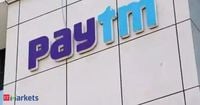Shares of One97 Communications, the parent company of Paytm, surged by 6.2% on May 7, 2025, following the release of its fourth quarter (Q4) results for the fiscal year 2025 (FY25). The company reported a consolidated net loss of ₹540 crore for the March quarter, a slight improvement from a loss of ₹550 crore in the same quarter of the previous year. However, the net loss attributable to the owners widened sequentially from ₹208 crore in Q3 FY25, raising concerns among investors.
The latest quarterly results included exceptional costs totaling ₹522 crore, which comprised a one-time, non-cash acceleration of Employee Stock Ownership Plan (ESOP) expenses amounting to ₹492 crore and an impairment of ₹30 crore related to an investment in a subsidiary. Excluding these exceptional items, the company's net loss for Q4 FY25 was significantly reduced to ₹23 crore, bringing its profit after tax (PAT) close to breakeven.
Revenue from operations for the quarter came in at ₹1,912 crore, reflecting a year-on-year decline of 16% from ₹2,267 crore in Q4 FY24. On a sequential basis, however, revenue rose nearly 5% from ₹1,828 crore in Q3 FY25. The operating revenue, which also included an increase in revenues from the distribution of financial services, was reported at ₹1,911 crore. Notably, the company received a UPI acquiring incentive of ₹70 crore during the quarter.
Despite the annual revenue decline, the contribution profit surged by 12% quarter-on-quarter to ₹1,071 crore, with the contribution margin remaining stable at 56%. The Earnings Before Interest, Taxes, Depreciation, and Amortisation (EBITDA) before ESOP costs improved to ₹81 crore, marking a significant quarter-on-quarter improvement of ₹121 crore. However, the EBITDA margin for the quarter dipped by 30 basis points year-on-year to 4%.
Paytm's net payment margin, including the UPI incentive, stood at ₹578 crore, while excluding the incentive, the margin was ₹508 crore, reflecting a 4% sequential increase. Payment processing costs also saw a decline of 9% quarter-on-quarter, resulting in savings of ₹50 crore. The total expenses for the quarter decreased nearly 20% to ₹2,154.9 crore from ₹2,691.4 crore in the corresponding period last year.
As of March 2025, Paytm's merchant subscriber base for devices reached 1.24 crore, with an addition of 8 lakh quarter-on-quarter. The company is optimistic about its financial services revenue, which increased to ₹545 crore, up 9% sequentially. Looking ahead, Paytm aims to enhance its high-margin financial services revenue by expanding partnerships and products.
Additionally, the company plans to strengthen its merchant payment ecosystem through innovations and the aggregation of Merchant Discount Rate (MDR)-bearing payment instruments. It also intends to drive Monthly Transacting User (MTU) growth via product innovation and disciplined marketing investments. Paytm's technology-led business model holds potential for international expansion, exploring opportunities in select geographies expected to yield results after three years.
Analysts have noted that the potential for policy clarity around MDR on UPI for large merchants could present incremental monetization opportunities for Paytm. Following the announcement of its quarterly results, shares of One97 Communications closed down by 5.90% at ₹815.30 on the BSE on May 6. However, the stock rallied over 6% on May 7 as investors reacted positively to the narrowing of losses.
Currently, the company’s share price is trading at ₹859.65, and its market capitalization stands at ₹55,135.36 crore. The stock has seen significant fluctuations, with a 52-week high of ₹1,063 and a low of ₹310. Over the past year, Paytm shares have surged by 143%, outperforming the BSE Sensex, which has risen by only 9.6%.
Brokerage firms have varying outlooks on Paytm's future performance. Emkay Global expects the company to turn net profit-positive in FY26, driven by revenue acceleration from both payment and financial services businesses, as well as lower depreciation and ESOP costs. Meanwhile, MOFSL has projected Paytm to turn EBITDA positive by FY27, valuing the company at ₹870 based on an 18 times FY30E EBITDA discounted to FY26E.
UBS has suggested a 'Neutral' rating on Paytm with a 12-month price target of ₹1,000, while Dolat Capital Markets has the highest price target at ₹1,200. Out of the 19 analysts covering Paytm, nine have a 'buy' rating, six recommend holding the stock, and four suggest selling.
As Paytm continues to navigate through its financial challenges, the upcoming quarters will be critical in determining its path towards profitability. The company remains focused on leveraging its strengths in the digital payments space to capitalize on growth opportunities.






